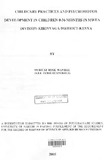Childcare practices and psychomotor development in children 0-36 months in Mwea Division-Kirinyaga District-Kenya
Abstract
In September-October 2002 a descriptive cross-sectional survey aimed at assessing the awareness
of psychomotor stimulation practices in 0-36 months old children drawn from households under a
Community Based Nutrition Programme/Family Life Training Programme zone was conducted
in Mwea division-Kirinyaga District. The principal tool of investigation was a structured
questionnaire that was administered to mothers of 0-36 months old children. Methods used for
investigation were anthropometric assessment, observation of motor, cognitive and social skills
on the study children, observation of maternal activities, timing of childcare activities and focus
group discussions. Purposive sampling was done at the programme level and random sampling at
the household level giving a sample size of 348 households in which there had to be a child aged
between 0-36 months. In any household with more than one child in this age category, simple
random sampling was done to avoid bias. Data was collected with the assistance of four field
assistants and SPSS computer package was used for data entry and analysis. Nutritional status
indices were computed using the Epi- Info programme. Analysis was mainly descriptive with
chi-square and correlation tests to assess the level of significance between proportions.
The study established that awareness of psychomotor stimulating activities is lacking in the study
community. Observation of maternal activities however showed that there were psychomotor
related activities, which the population could not relate to the development of children. For
example play to many mothers was there for its own sake but not to exceed a certain age limit.
For those who provided playthings (23.1 %), this was mainly to distract the attention of the child.
Teaching of skills was reported to commence when the child achieved movement and language
skills. Skills taught were not cognitive challenging as they involved simple physical activities
including speaking (63.0%), singing (22.6%), sweeping (1.6%) carrying dolls (2.5%), walking
(10.3%). Of the psychomotor acti vities observed, holdi ng and carrying chi Id took relati vel y more
time compared with the other psychomotor activities perhaps why gross motor ability ranked
higher than either fine motor and cognitive abilities. Low achievement in psychomotor skills by
those children who were confined indoors was significant suggesting that lack of experience
could be contributing to the poor achievement. Many mothers however pointed out that they
were too busy to play with or teach skills to their children.
Very few activities were regarded as childcare activities nalllely:- food preparation, feeding,
bathing, breastfeeding and washing child's clothes. These activities were not significant with
maternal characteristics but breastfeeding and feeding were significant with the age of the child.
The study established that Mwea was better off compared to the national figures in the prevalence
of malnutrition. The global stunting malnutrition, (28.1 %) is lower in comparison to the national
figures (33%). Global underweight (18.1 %) and global acute malnutrition (6.6%) are lower than
national figures (22%) and (6.7%) respectively. This may be a suggestion that the Community
Based Nutrition Programme on their fight against malnutrition have had a positive impact on
nutritional status of the children. Though the sample size was small to make conclusive decisions,
stunted children achieved lowest in psychomotor abilities compared to the underweight or wasted
children.
Nutritional status by gender indicated boys to be better off than girls. Observation showed boys
being breastfed more than girls and getting relatively larger portions of food. This may suggest
the community is still clinging to the age-old beliefs that boys are superior to girls. However, this
gender disparity was not significant with psychomotor abilities.
The study established that (96.2%) is socio-economically poor and majority (72.1 %) were not
aware of time saving methods while the rest (27.9%) could not afford the time/labour saving
devices. Of the caregivers identified in the study area, housegirls, though in very few households
(I. I%) were found to contribute more positively to the nutritional status and psychomotor
development of study children. Apart 'from the CBNP that offers nutritional approach to
eradicating malnutrition and child growth monitoring services, the only other institutions offering
pre- and post-natal services for 0-36 months old children are the health institutions in or around
the irrigation scheme area. However, services are hampered by the long distances to travel, lack
of proper means of transport, cost of services and lack of enough equipment and manpower.
It is therefore recommended that the study community is made aware of chi Idcare practices and
thei r value. Awareness of psycho-sti mulati ng activities and how they contribute to the Iife-long
productivity of the child (economically, culturally and socially) would perhaps change the
attitude accorded to the child.
Citation
Muriuki, R. W(2005).Childcare practices and psychomotor development in children 0-36 months in Mwea Division-Kirinyaga District-KenyaSponsorhip
University of NairobiPublisher
Department of Food Science, Nutrition and Technology, University of Nairobi
Subject
Child care practicesPsychomotor development
Children
Mwea Division
Kirinyaga District
Kenya
Description
Msc Thesis

